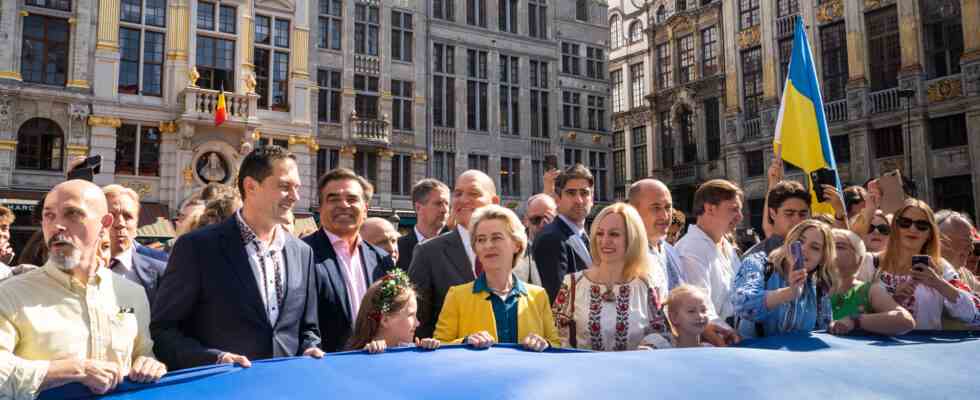Status: 08/26/2022 09:17 a.m
Russia’s war in Ukraine has triggered an energy crisis in Europe – and high costs for the countries. The EU countries are now arguing about how to handle this: through new debts or personal responsibility?
Is it 100 billion, 500 billion or in the end well over 1000 billion euros that the war in Ukraine will cost the European Union? No one can reliably estimate that at the moment. And nobody in Brussels seriously wants to try that, because nobody knows how long the war and the bloodshed will last there.
And yet one thing is already clear, says Rene Repasi, SPD member of the European Parliament and professor of European law at the University of Rotterdam: “The expenses that Europe is facing are enormous – there are rising energy prices that you have to deal with, there are the arms shipments, which will also increase and there will be more expenses.” Among other things, Repais includes the reconstruction of Ukraine – “as part of the promise that Ukraine can one day become a member of the European Union.”
Pricing policy is a matter for the state – for now
This has been a particular concern of EU Commission President Ursula von der Leyen since Russia attacked Ukraine six months ago. Since then, she has always said that the country wants to be part of the community of democratic European states – and two months ago she even invited to a first donor conference for the reconstruction of the country in Lugano to send a signal that Europe is adapting will participate in this reconstruction. With Europe’s help, von der Leyen said, the friends in Ukraine could rebuild their country – not just the way it was, but the way the young generation of people there wanted to shape it.
Many thought such words were somewhat premature – and yet they show that the EU now has a duty: Ukraine was finally given the status of an EU candidate country. It is said that the costs will be discussed in due course.
There is already talk of the cost to the EU of the energy shortages caused by this war. However, so far mainly in the EU member states themselves. Because the cost subsidies, the price cap or the German gas surcharge are national decisions – for now.
Because at least for the social democratic member of the European Parliament Repasi it is clear: “The economic and social consequences of the war will plunge us into a deep economic and social depression – or demand a lot of money from the public sector to take action against it.” Economically strong states like Germany could still shoulder this with their own resources, but other states have long since reached their limits.
An Energy Crisis Bailout Fund?
You can think of Italy, Spain, maybe even France, and also countries like Bulgaria or Romania. These are countries that have already accumulated so much national debt that financing it is a growing concern for many, even in the face of rising interest rates. And countries, some of which are still struggling hard with the economic consequences of the Corona crisis – with high youth unemployment, for example – like Spain.
Economists are already warning that the monetary union could get into a dangerous imbalance as a result. You shouldn’t let it come to that, says Damian Böselager, member of the European Volt party in the European Parliament. He proposes a new EU investment program financed with common debt – similar to the Corona rescue fund: The EU should set up a program to tackle supply bottlenecks across Europe – that means investing specifically where new production capacities can be created.
In order to “relax” the price of energy, investments should flow into renewable energies wherever possible. That would not only be European solidarity, but also a way to make Europe’s future energy independent. The EU Economic Commissioner Paolo Gentiloni from Italy has already outlined it in a similar way.
Controversy over debt
The European Parliament member Markus Ferber from the CSU does not question the goal – new joint debts of the EU do, however. The Corona Fund was an absolute exception, he says: “A new debt program would also have to include an increase in the multi-year financial framework, which would have to be ratified by all national parliaments – I can’t imagine that working.”
From now on, this question is likely to be the subject of intense debate. In Brussels. And between the capitals. The only thing that is certain is that a lot of money will be needed in the near future – and it has to come from somewhere.

